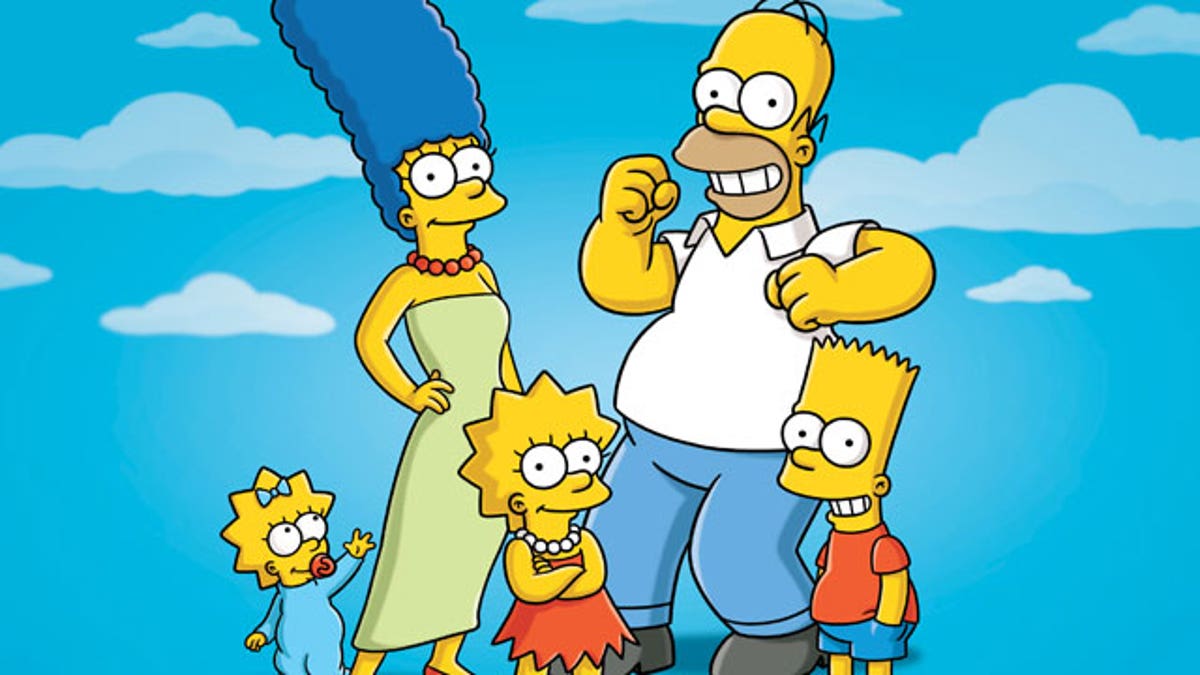
The Simpsons (AP)
As it prepares to air its 500th episode on February 19, The Simpsons is now firmly established in modern American history as a cultural masterpiece.
Smarty-pants professors with Ph.D.s discuss the show in the heady jargon of academe at scholarly conferences and in journal articles and books; the venerable Oxford English Dictionary has added Homer’s exasperated grunt "D'oh" to its list of officially recognized words; and the United States Postal Service has issued a series of first class stamps bearing portraits of the members of the Simpson family.
The show has been embraced by the establishment. It has become a “classic.” To praise its many virtues has become orthodoxy.
It was not always so, however. When The Simpsons first appeared as a spin-off from "The Tracey Ullman Show" in the final weeks of the 1980s, many people were not happy.
President George H.W. Bush, speaking in favor of the American family in 1992, compared "The Simpsons" to "The Waltons" and found "The Simpsons" wanting in terms of what a family should be.
While Bill Cosby was still playing the head of the utopian Huxtable family in 1991, he lamented that Bart Simpson was a very bad role model. And, of course, as “Bartmania” gripped the culture in the early seasons of The Simpsons, legions of middle-school teachers had a cow, man, when their newly-empowered underachievers showed up to class in T-shirts commanding them not to.
By the late 1990s, however, anyone who watched the show had to concede that it was a lot more than just a snotty cartoon.
In 1998, Robert Pinsky, then holder of the highbrow title of poet laureate of the United States, praised the “brilliant” and “masterful” nature of the show in the New York Times magazine.
In 2001, two very earnest books about the series were published: "The Simpsons and Philosophy" was a collection of essays, mostly by scholars, that explored the fundamentals of philosophic thought through the lens of the program, and "The Gospel According to the Simpsons" examined the theological and spiritual aspects of the show. The latter title was used in study groups in churches across the country.
Not only did the cultural attitudes toward the show change as the seasons progressed, but how we viewed each episode could change as we grew older.
At the age of ten, one might watch an installment of the show just for the misbehaving antics of Bart. At the age of eighteen, one might watch the very same episode and derive pleasure from all the references to politics and popular culture that one had completely missed on the earlier viewing.
The older and wiser one gets, the more one sees in any given episode of The Simpsons.
This is one reason why "The Simpsons" may turn out to be the most enduring and rerun-able television series of all time.
Like a fine poem, each time you encounter it you find something new. There are other reasons to predict a bright future for the show in syndication, online, and on DVDs long after it has ceased production.
Given its unique animated style, the show will never become dated by the clothing or hairstyles of the characters, neither of which were ever “in style” in the first place.
Furthermore, there are already enough episodes to rerun the show five days a week for nearly two years without repeating a single episode.
One of the reasons that a TV show like "I Love Lucy" continues to find an audience over a half-century after the final episode was filmed is that the comedy of that show is timeless: it didn’t depend much upon contemporary references to what was going on in the world at the time.
Some might argue that fifty years from now, the social, political, and cultural satire that made "The Simpsons" so hip will be incomprehensible to later generations who will have no knowledge of what much of that satire is referring to.
It might also be argued, however, that "The Simpsons" will act as a kind of museum of the culture of the last decade of the 20th century and the first decades of the 21st.
This may already be happening, in fact.
Many of my undergraduate students have revealed to me that all that they know about the likes of Tony Bennett, Elizabeth Taylor, Peter Frampton, Amy Tan, and John Updike is what they learned watching reruns of "The Simpsons." One student even told me that she had begun reading the extensive oeuvre of Thomas Pynchon after she saw the reclusive author appear twice on "The Simpsons." Pynchon, it should be pointed out, writes very challenging post-modernist novels that most professors don’t expect their students to read even when they are assigned.
Over the last decade or so, many have opined that "The Simpsons" has passed its prime--it’s lost its edge; jumped the shark--and some of that may be true. It may also be true that after the latest contract expires, it may be time to call it a day.
Still, I think that even a bad episode of "The Simpsons" is better than most of the rest of the comedy on broadcast television, and that we’ll continue to watch this show for many, many years to come.
Robert J. Thompson is the founding director of the Bleier Center for Television and Popular Culture at Syracuse University, where he is also a Trustee Professor of Television and Popular Culture at the S.I. Newhouse School of Public Communications. He was a visiting professor for six summers at Cornell University and served for nine years as professor and director of the N.H.S.I. Television and Film Institute at Northwestern University.








































